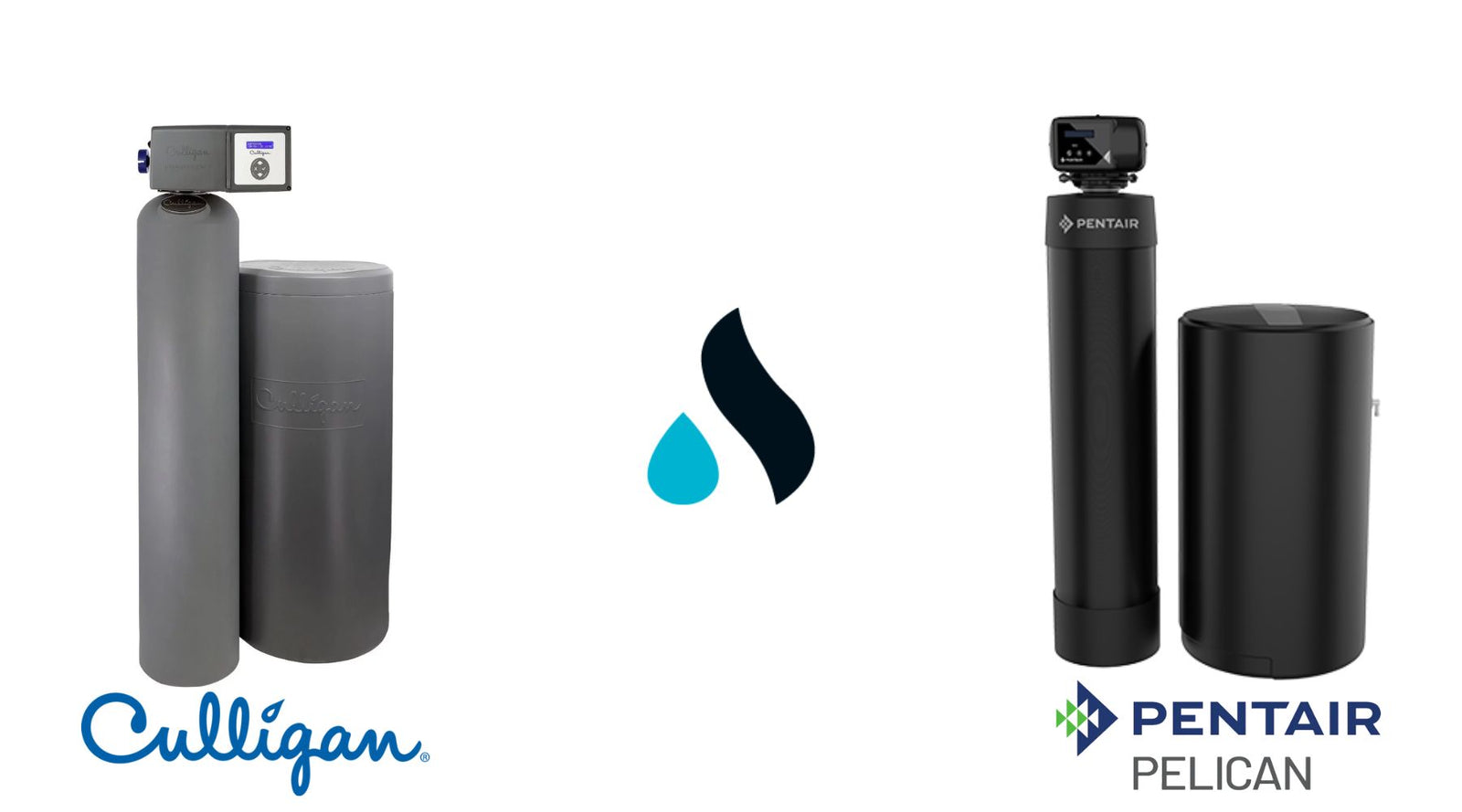Your Cart is Empty
Menu

Have a question? Call us 7 days a week!
Culligan vs Pelican Water Softener - A Comprehensive Comparison
August 15, 2024 6 min read

Culligan vs Pelican Water Softeners - What's the difference?
When it comes to improving the quality of your home’s water, investing in a water softener or a comprehensive water filtration system is often a top priority. Hard water, which contains high levels of minerals like calcium and magnesium, can lead to a range of problems, from dry skin and dull hair to the buildup of limescale in pipes and appliances.
Two of the most reputable brands in the water softening industry are Culligan and Pelican. Both companies offer high-quality products, but they cater to different needs and preferences. In this article, we’ll dive deep into the Culligan vs. Pelican water softener debate, helping you make an informed decision for your home.

Understanding Water Softener Systems
Before we delve into the specifics of Culligan and Pelican, it’s important to understand how water softeners work. Water softeners typically use a process called ion exchange to remove the calcium and magnesium ions that cause water hardness. An ion exchange water softener functions by replacing these hardness ions with sodium or potassium ions, effectively softening the water.
Overview of Culligan Water Softeners
1. Brand Reputation and Experience
Culligan is a well-established name in the water treatment industry, with a history dating back to 1936. The company is known for its reliable products, extensive service network, and strong customer support. Culligan offers a range of water softeners that cater to different household sizes and water hardness levels.
2. Product Range
Culligan’s product line includes a variety of salt-based water softeners. Their salt-based models, such as the High Efficiency (HE) series, are designed to optimize salt, water, and electricity usage, making them more environmentally friendly. The Culligan HE 1.25 Water Softener, for example, is known for its efficiency and customization options, allowing users to adjust settings based on their specific water usage patterns. Culligan also offers whole house water softeners to cater to different household sizes and water hardness levels.
3. Technology and Features
Culligan water softeners are equipped with advanced technology that sets them apart from many competitors. Many Culligan water softeners are certified by the National Sanitation Foundation (NSF) for their efficiency and quality. Some of the standout features include:
-
Smart Controllers: Culligan’s softeners often come with smart technology that allows you to monitor water usage, track salt levels, and receive alerts when maintenance is needed.
-
Customizable Settings: Many Culligan models offer customizable settings to optimize performance based on your household’s water usage patterns.
-
Efficient Regeneration: Culligan’s HE series is designed to regenerate only when necessary, which saves water, salt, and energy.
4. Installation and Maintenance
Culligan offers professional installation services, which is a big plus for homeowners who prefer a hands-off approach. However, it's important to note that professional installation can increase the overall water softener installation cost, as different systems may incur different expenses based on plumbing accessibility and installation complexity.
Additionally, Culligan provides regular maintenance and servicing options, ensuring that your system remains in optimal condition. However, these services can come at a premium, and the ongoing maintenance costs should be considered when making a decision.
5. Cost
Culligan water softeners tend to be on the pricier side, both in terms of upfront costs and ongoing maintenance. However, the company’s reputation for durability and customer service often justifies the investment for many homeowners.

Overview of Pelican Water Softeners
1. Brand Reputation and Experience
Pelican Water Systems, now a part of Pentair, has gained a strong reputation for offering eco-friendly and innovative water treatment solutions. While not as old as Culligan, Pelican has quickly established itself as a leader in the water softening industry, particularly among environmentally-conscious consumers.
2. Product Range
Pelican, which was previously known for its salt-free water conditioning systems, now focuses exclusively on salt-based water softeners. This shift allows Pelican to provide more traditional and highly effective water softening solutions, similar to those offered by Culligan.
Pelican’s flagship salt-based models, like the Pelican Advantage Series, use ion exchange technology to remove hardness minerals from water, providing all the benefits of softened water, such as reduced scale buildup and softer skin and hair. Additionally, Pelican offers reverse osmosis systems as part of their advanced filtration options, enhancing water quality by effectively removing contaminants.
3. Technology and Features
Pelican water softeners are designed to be highly efficient and user-friendly. Key features include:
-
High Efficiency: Pelican’s systems are engineered to minimize water and salt usage, making them both cost-effective and environmentally friendly.
-
User-Friendly Design: Pelican water softeners are designed for easy operation, with straightforward controls and minimal maintenance requirements.
-
Advanced Filtration Options: In addition to water softening, Pelican offers combo systems that include advanced filtration to remove chlorine, chloramines, and other contaminants from your water supply. Pelican's advanced filtration options ensure that the drinking water is free from contaminants.
4. Installation and Maintenance
Pelican water softeners are designed for straightforward installation, and many homeowners opt to install the system themselves, which can save on installation costs. The maintenance requirements are minimal, though the system will require periodic salt refills, as is standard with salt-based softeners.
5. Cost
Pelican water softeners are competitively priced, offering an attractive balance between upfront costs and ongoing expenses. When considering the water softener cost, it's important to factor in not only the initial installation but also the ongoing monthly expenses for maintenance, salt refills, and system efficiency tailored for different household needs.
The efficiency of their systems means you may save on salt and water usage over time, making them a cost-effective choice for many households.

Culligan vs. Pelican: Head-to-Head Comparison
1. Water Softening Efficiency
-
Culligan: Salt-based systems like those from Culligan are highly effective at softening water by removing hardness minerals. This can be crucial for households with extremely hard water. Using soft water can reduce scale buildup and improve the efficiency of household appliances.
-
Pelican: Pelican’s salt-based systems offer similar effectiveness, providing a reliable solution for softening even the hardest water.
2. Environmental Impact
-
Culligan: While Culligan’s HE models are designed to be more efficient, they still use salt and produce wastewater during regeneration.
-
Pelican: Pelican’s systems are also designed to be efficient, reducing salt and water waste, though they still require salt and produce wastewater, as is standard with salt-based systems.
3. Installation and Maintenance
-
Culligan: Professional installation and ongoing maintenance are recommended, which can increase costs over time.
-
Pelican: Pelican systems are easy to install and require minimal maintenance, making them more cost-effective in the long term.
4. Cost
-
Culligan: Higher upfront and maintenance costs, but with proven effectiveness for softening very hard water. The water softener system cost for Culligan can vary significantly based on factors such as size, brand, type, labor, and additional modifications required for installation.
-
Pelican: Competitive pricing with efficient performance, offering a balance of cost and effectiveness.
5. Customization and Smart Features
Culligan: Offers advanced smart features and customization options for users who want to optimize their system’s performance. Both Culligan and Pelican offer a range of water softener systems with various features to meet different household needs.
Pelican: Focuses on efficient performance with user-friendly design, though it may offer fewer advanced customization options compared to Culligan.
Conclusion: Which One Should You Choose?
The choice between Culligan and Pelican water softeners ultimately depends on your specific needs and priorities.
-
Choose Culligan if:
-
You have very hard water and need a system that can effectively remove hardness minerals.
-
You prefer a system with advanced technology and customizable settings.
-
You don’t mind paying a premium for professional installation, maintenance, and service.
-
-
Choose Pelican if:
-
You are looking for a competitively priced, high-efficiency salt-based water softener.
-
You want a low-maintenance system that you can easily install yourself.
-
You value an environmentally conscious approach with a focus on reducing waste and salt usage.
-
Both Culligan and Pelican offer high-quality water softening solutions, but their systems are designed to meet different needs. By carefully considering the water hardness in your area, your environmental concerns, and your budget, you can make the right choice for your home.
Whether you opt for Culligan’s tried-and-true salt-based softeners or Pelican’s efficient and user-friendly models, you’ll be taking a significant step towards improving the quality of your home’s water.
Did we miss anything in our analysis? Feel free to share your feedback or leave a comment below!
Leave a comment
Comments will be approved before showing up.

